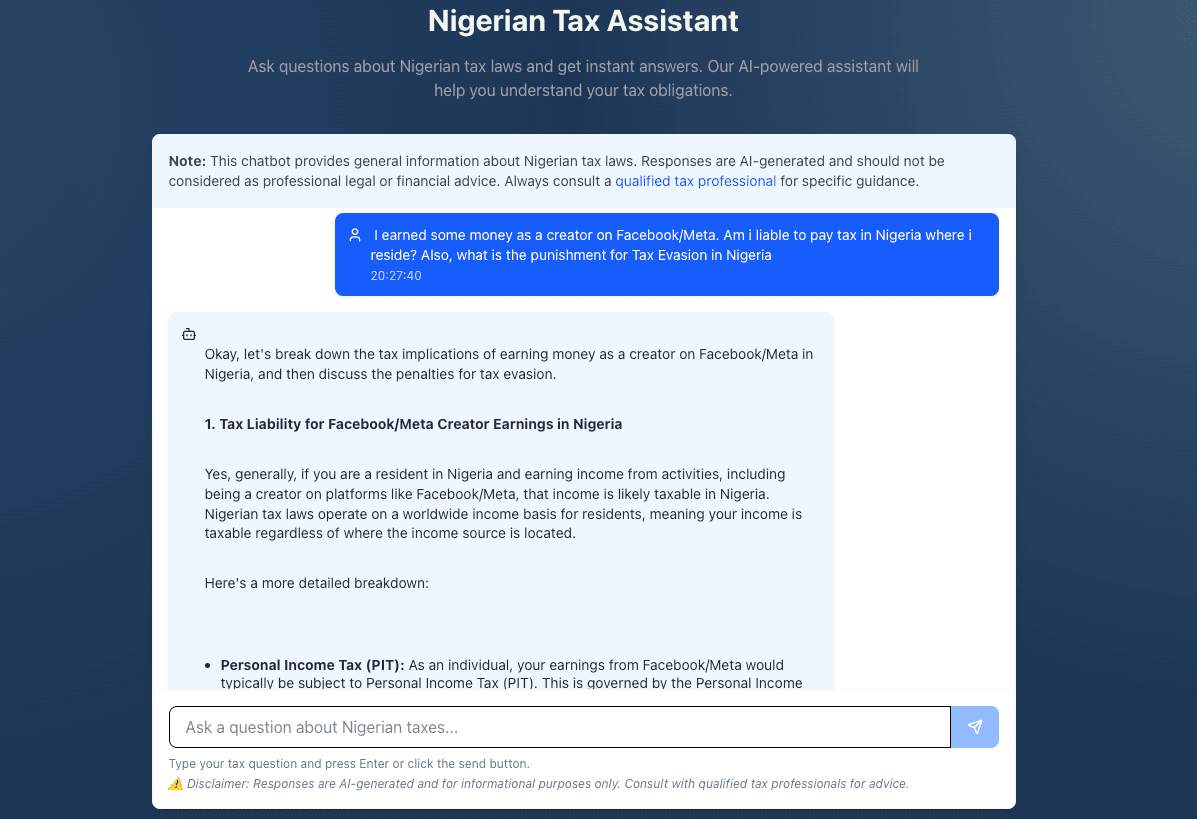VeryDarkMan recently went public about his encounter with the Economic and Financial Crimes Commission (EFCC), revealing allegations of Tax Evasion and money laundering. His arrest sparked nationwide debate, but it’s the details of the potential charges that have truly ignited conversations, particularly among Nigeria’s growing population of young content creators who rely on social media as a primary source of income.
In light of these events, many are wondering: What exactly is Tax Evasion, and how can digital entrepreneurs stay compliant? To help answer these pressing questions, we consulted our AI-powered Tax Assistant—an intelligent chat interface trained specifically on Nigerian tax laws.
Disclaimer: This article does not constitute legal or financial advice. For accurate guidance on tax matters, please consult a qualified tax professional or lawyer.

We are reproducing the response to our question below.
Question - I earned some money as a creator on Facebook/Meta. Am I liable to pay tax in Nigeria, where i reside? Also, what is the punishment for Tax Evasion in Nigeria?
Response -
Okay, let's break down the tax implications of earning money as a creator on Facebook/Meta in Nigeria, and then discuss the penalties for tax evasion.
1. Tax Liability for Facebook/Meta Creator Earnings in Nigeria
Yes, generally, if you are a resident in Nigeria and earning income from activities, including being a creator on platforms like Facebook/Meta, that income is likely taxable in Nigeria. Nigerian tax laws operate on a worldwide income basis for residents, meaning your income is taxable regardless of where the income source is located.
Here's a more detailed breakdown:
- Personal Income Tax (PIT): As an individual, your earnings from Facebook/Meta would typically be subject to Personal Income Tax (PIT). This is governed by the Personal Income Tax Act (PITA) as amended.
- Source of Income: The key factor is whether the income is deemed to have a source within Nigeria. Since you are a resident in Nigeria and presumably creating content and engaging with your audience from within Nigeria, the income is generally considered to have a Nigerian source.
- Taxable Income: Your taxable income would be your gross earnings from Facebook/Meta, less any allowable expenses. Keeping accurate records of your income and expenses is crucial.
- Allowable Expenses: You can deduct expenses that are wholly, reasonably, exclusively, and necessarily incurred in the production of your income. This might include things like:
- Internet data costs
- Equipment used for content creation (cameras, microphones, software, etc.)
- Training and courses related to your content creation skills
- Advertising and promotion expenses
- Tax Rate: The applicable PIT rate depends on your total annual taxable income. Nigeria uses a graduated income tax system, meaning the more you earn, the higher the tax rate. Refer to the current PITA schedule for the applicable rates.
- Tax Identification Number (TIN): You will need a Tax Identification Number (TIN) from the Federal Inland Revenue Service (FIRS) to file your taxes.
- Filing and Payment: You are responsible for filing your annual tax returns and paying any taxes due to the FIRS. The due date for filing is typically March 31st of the following year. There are various ways to file and pay taxes, including online platforms provided by FIRS.
- VAT (Value Added Tax): The Finance Act 2020 has provisions that may affect digital services. While the specifics can be complex, it's important to be aware of the possibility that VAT could apply to digital services you provide, particularly if you are registered (or required to be registered) for VAT. However, this often depends on the nature of the services, the location of your customers, and whether you exceed the VAT registration threshold.
2. Punishment for Tax Evasion in Nigeria
Tax evasion is a serious offense in Nigeria. The penalties can be severe and include:
- Financial Penalties:
- Understatement of Income: Penalties can be a percentage of the tax evaded (e.g., 10% plus interest at the commercial rate).
- Late Filing/Payment: Penalties are imposed for late filing and/or late payment of taxes.
- False Information: Providing false or misleading information to the tax authorities can result in significant fines.
- Imprisonment: In more serious cases, tax evasion can lead to imprisonment. The length of imprisonment can vary depending on the severity of the offense, but it can be several years.
- Seizure of Assets: The government may seize assets to recover unpaid taxes, penalties, and interest.
- Prosecution: The FIRS has the power to prosecute individuals and companies for tax evasion. Convictions can result in a criminal record.
Specific provisions for penalties are found in the various tax laws, including PITA, CITA (Companies Income Tax Act), and VAT Act, and other relevant legislation.
Disclaimer:
- This information is for general guidance only and does not constitute professional tax advice. Tax laws and regulations are subject to change, and the interpretation of these laws can vary.
- The information provided is based on my understanding of current Nigerian tax laws but may not be exhaustive or reflect the most recent updates.
- You should consult with a qualified tax advisor or accountant in Nigeria for personalized advice based on your specific circumstances. They can help you determine your tax obligations, identify allowable deductions, and ensure compliance with Nigerian tax laws.
- I am not responsible for any actions taken or not taken based on this information. It is crucial to verify all information with official sources and professional advisors before making any tax-related decisions.
In summary, as a resident Nigerian earning income from Facebook/Meta, you are likely liable for Personal Income Tax. It's crucial to keep accurate records of your income and expenses, obtain a TIN, file your tax returns on time, and pay any taxes due. Tax evasion is a serious offense with potentially severe penalties. Always seek advice from a qualified tax professional to ensure compliance.
